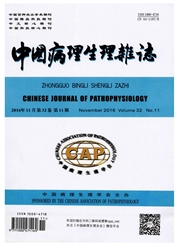

 中文摘要:
中文摘要:
目的:探讨前列腺特异性膜抗原基因复制缺陷型腺病毒(Ad—PsMA)转染的树突状细胞(DC)与细胞因子诱导的杀伤细胞(CIK)共培养后回输体内能否抑制前列腺癌生长。方法:24只免疫缺陷雄性小鼠皮下接种LN—caP细胞构建前列腺癌(PCa)模型。将荷瘤小鼠分成4组,分别回输生理盐水(Ns)、CIK、Ad—DC—CIKs以及Ad—PS—MA~DC-CIKs,6周后处死小鼠,记录肿瘤重量并行病理学检查和TUNEL凋亡分析。结果:治疗后肿瘤重量在cIK和Ad—DC—CIKs组无显著性差异(P〉0.05),其他组间均有显著性差异(P〈0.01)。病理学和TuNEI。凋亡分析显示NS组PCa腺体结构完整,cIK和Ad~DC—CIKs组移植瘤癌巢部分破坏,而Ad—PSMA—DC—CIKs组癌巢完全破坏,肿瘤细胞片状坏死,凋亡显著。结论:Ad-PSMA负载的DC与CIK共培养回输体内诱导前列腺癌细胞凋亡和坏死,显著抑制肿瘤生长,该研究为PCa尤其是激素难治性PCa提供了一种有效的免疫治疗手段。
 英文摘要:
英文摘要:
Objective: To test whether immunotherapy with dendritic cells (DC) transduced by adenovi- ral vector carrying prostate specific membrane antigen (Ad-PSMA) and coeultured with cytokine- induced killer cells (CIK) is capable of inhibiting prostate cancer (PCa) in vivo. Methods: Twen- ty-four inbred male severe combined immunodeficiency mice were used to generate animal PCa model by subcutaneously implanting LNcaP cells. When the tumor reached 4.5-5.5 mm in diame- ter, mice were randomly divided into four equal groups and treated with normal saline (NS), CIK, Ad-DC-CIKs, or Ad-PSMA-DC-CIKs on day 7 of the cocultivation respectively. Every mouse was intravenously injected every other day for five times. Six weeks after the first injec- tion, mice were sacrificed and tumor weight were recorded. Subcutaneous tumors were checkedby HE staining and TUNEL assay. Results: After treatment, there was no significant difference in tumor weights between CIK and Ad-DC-CIKs group, but among other groups. By histopatho- logical examination, the glandular structures of PCa were partially destroyed in CIK and Ad-DC- CIKs groups. However, cancer nests were completely destroyed in Ad-PSMA-DC-CIKs group. The apoptosis cells were significantly increased in Ad-PSMA-DC-CIKs group than in CIK group. Conclusion: Ad-PSMA-pulsed DC cocultured with autologous CIK induced necrosis and apoptosis of PCa cells and significantly inhibited tumor growth in vivo. This provides a potential immuno- therapy strategy for hormone-refractory PCa.
 同期刊论文项目
同期刊论文项目
 同项目期刊论文
同项目期刊论文
 期刊信息
期刊信息
